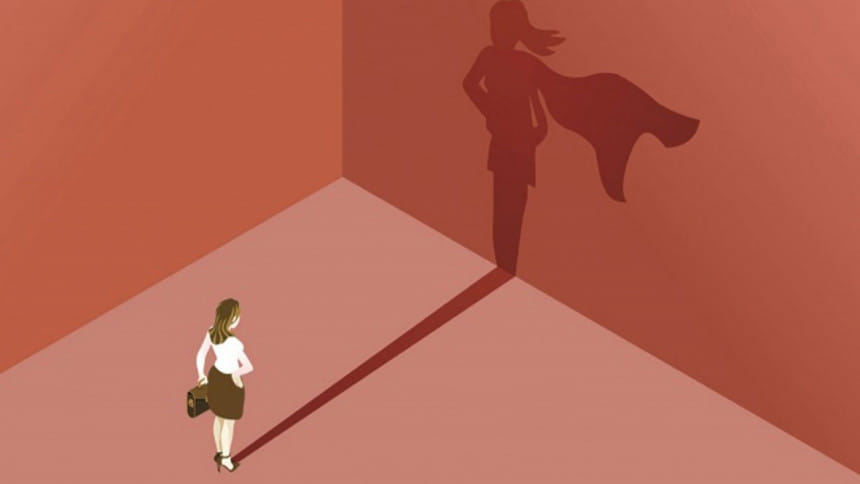Women in leadership

Since the beginning of time, many distinctions have been made between men and women. The drawing of these dissimilarities has, more often than not, placed women at a lower station than men in terms of social and economic hierarchy. This phenomenon is so pervasive that most ethnographic and archaeological accounts have distorted the past, and have instead chosen to enshrine men as the heroes and rulers of all ages, while narrating women as being subservient. After all, as the saying goes: history is indeed written by the winners, and the unfortunate truth of the matter is that sexism and gender disparity have allowed more men to hold power than women.
The constant erasure and containment of women and their strength has led to widespread misconceptions about gender and power. Men and women through history and into the present have used these biases and false impressions to construct glass ceilings and boundaries. In Bangladesh, even today, when most people see a woman breaking down socio-cultural barriers, be it leading a team, driving a car, or simply speaking up in a meeting room, an impulsive reflex leads to insecurity or unfair criticism. Many people still fail to acknowledge that gender is not as rigid as it seems.
In my first-ever fulltime job, I was sent to rural Sylhet for six months on a sales stint, where my first encounter with patriarchy was when my sales team introduced me to retail shopkeepers as "madam from head office" at the largest wholesale market there. I was looked at from head to toe, scrutinised to the extent I felt X-rayed, and then, abruptly, dismissed. Shopkeepers won't talk to a "madam"—there is no conversation unless you are a man.
My boss at the time admitted that he had expected a call from me within a week of my posting—that I would ask to be switched back to a cushioned Head Office role in Dhaka. Instead, I held my ground. I visited that shopkeeper every day until he was compelled to talk to me about growth plans for his business.
Years passed and my encounters with patriarchy continued. Every payday statement—like "what will you do with so much money, your dad pays for everything", or "how many new lipsticks will you buy this month"—was commonplace. My response was not verbal; I retaliated with hard work, and my performance spoke for itself. That, yes, I earn my keep.
Just recently, in a meeting with the top-level management of a renowned advertising firm, we were deciding on casting options for the role of a strong and powerful boss. My recommendation of casting the role as female was met with this statement from one of the directors of the firm: Does intellectualism and power go with women?
Ideas and notions of gender are fluid. No gender is better than the other, and gender is not a limitation when it comes to intelligence, talent or skill. In fact, time and time again, when provided with equal opportunities and afforded inclusive environments, women have proven that they are capable of reaching any target and achieving any goal. It is a proven fact that leadership only really requires vision, sound logic, courage, and good management skills—none of which are subject to one's gender identity.
Statistics show that in the Asia-Pacific region, only 17.1 percent of CEOs/Head of Businesses are women. India, with social and economic perspectives similar to ours, has the third-lowest global representation of women in managerial roles, ahead of only South Korea and Japan in the APAC region. The total percentage of women in senior management in the Asia-Pacific region currently stands at 27 percent. These statistics and figures are simply unacceptable in 2021.
Thankfully, the concept of gender parity and the desire to establish a bias-free professional sphere for women in Bangladesh have seen increased interest in recent years. According to World Bank, Bangladesh saw a leap in the female workforce from 23 percent in 1990 to 40 percent in 2019. The government's progressive and modern vision for the nation, as well as initiatives by various forward-thinking organisations, have managed to set in motion the process of changing age-old misconceptions regarding women's capability and competency in the workforce.
In fact, one of the country's most promising fields is the Readymade Garments (RMG) sector where more than 60 percent of the workers are women, according to a survey of the Centre for Policy Dialogue (CPD). Beyond the RMG industry, women across the country are being offered opportunities when it comes to both formal and informal sectors. Even though we have a long way to go in building an inclusive and equitable society and economy, changes have started to take place across industries.
In the business world and in other industries across Bangladesh, many women have also made their mark, and in so doing, inspired countless others to pursue their dreams and aspirations. Seeing the major progress Bangladesh has made as a result of these resolute and assertive women should make it evident to the masses that patriarchal notions of how the world should work are outdated, and best only when cast aside and rendered meaningless.
To sustain this trend of empowering women in all dimensions of life, we must remain vigilant and committed to the cause. Investments in education must be made to make sure the cycles of poverty are broken, and to create a workforce full of educated and confident women with new ideas and innovations. We must guarantee that more women are welcomed into positions of leadership in politics, the legal system, academia, and in business. In order to do this, women must be offered the same opportunities as men, especially with regard to pay and benefits. A focus must be placed on succession, and industries across the nation must commit themselves to breaking down gendered career paths.
Lastly, the commitment to inclusion must be genuine and a concerted effort must be put in place so that we achieve inclusivity in the near future. It is of paramount importance that we take all decisions keeping inclusion and diversity as a priority, be it at home, social circles, or workplace. Only then will we be able to eliminate the gender gap and build an inclusive society.
As we celebrate the upcoming International Women's Day 2021, we should all commit ourselves to a more progressive future where gender no longer limits one's prospects or success. In order to celebrate the women in our lives and women around the world, we must constantly address any biases and prejudices we (or those around us) may have. To my ladies who have ever felt that they cannot do something just because of their gender, my two cents: take that sales job, ride your bike, get angry, laugh as loudly as you can, and don't let anyone tell you otherwise. Let us not only touch that glass ceiling, but also break it. Let us celebrate as women in Bangladesh and across the world redefine the rules to usher in a new era of equality and inclusivity.
Manisha Safiya Tarek is Head of Marketing, foodpanda Bangladesh.
Email: [email protected]

 For all latest news, follow The Daily Star's Google News channel.
For all latest news, follow The Daily Star's Google News channel. 



Comments